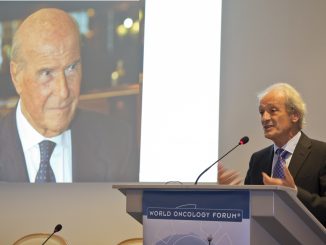New drugs being approved for treatment of patients with cancer are providing an average of only 2.5 months of extra life, a leading researcher has told the World Oncology Forum (WOF). Tito Fojo, Professor of Medicine at Columbia University, New York, and a former principal investigator for the National Cancer Institute, said that the clinical trials system was largely delivering marginal benefits to patients at great cost.
The 86 therapies approved by the Food and Drug Administration in the US between 2006 and 2017 to treat solid tumours had a median gain in progression free survival of 2.55 months and an overall survival gain of 2.45 months. Between one and two thirds of cancer therapies approved for solid tumours in the US and in Europe may be harming as many patients as they help.
Tito Fojo told WOF, at its meeting in Lugano in October, “Every therapy that we begin on a patient has a chance to benefit them, but it also has a chance to harm them. If on top of that you add the harm that comes from the toxicity of drugs, a lot of therapies are actually more likely to harm you than to benefit you.”
The current system brings substantial profits for the development of me-too drugs that add little to current options, while too little research is being done into discovering which patients are most likely to benefit, he said.
Interviewed during the WOF, Tito Fojo, said: “Every drug is good for a small fraction of patients. The problem is identifying that small fraction of patients and it is incredible how difficult that is proving. It is also incredible how quickly that becomes less and less interesting.”
It was easy to blame ‘evil’ pharmaceutical companies but cancer scientists have to share the blame for losing focus.
“We want to part of the new and exciting therapies, not trying to understand why a drug approved five or even ten years ago is effective in only a small fraction of patients and who those are. We have drugs that are not very good in the large majority of patients but are actually quite good in a fraction of patients, but we have no idea who those patients are.”
This was true he said not only for older drugs like bevacizumab, but also for the new immunotherapies targeting PD-1 or PD-L1 which bring huge benefits but only to some patients. “We are not even through the first few years of this and you are starting to see already some people growing increasingly disinterested in pursuing something that will indicate to us who will benefit and who will not.”
Tito Fojo says a better research and trials system would deliver longer survival benefits. “I think we as a society don’t want to be spending a lot of money on drugs that are ineffective. We want to turn our energies and our resources to conducting trials that are meaningful and will be valuable for our patients and for society as a whole.”






Leave a Reply